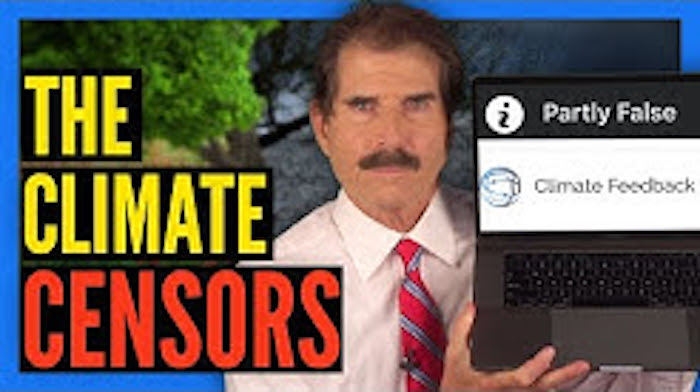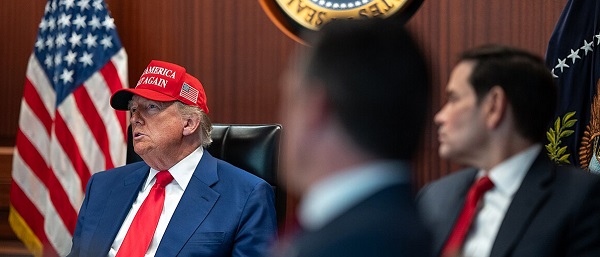Environment
Emmy Award Winning Journalist reveals how “fact checkers” punish ‘tone’ even when the facts check out

When one of media’s most successful journalists is constantly punished by Facebook Fact Checkers it makes for a compelling story all on it’s own. Does a 19 time Emmy Award Winning Journalist not check his facts? Well… turns out the facts aren’t the problem. Enjoy some more revealing insight from John Stossel.
From StosselTV
Before Facebook censored it, my video, “Are We Doomed”, got more 24 million views. You can watch it here: https://www.youtube.com/watch?v=b8JZo… Now Facebook won’t show it to many people — not even to my subscribers. Facebook’s also punishing Stossel TV by showing our other videos less. All because Facebook foolishly gave Emmanuel Vincent, a recent PhD graduate from France, the power to censor. Vincent assembled a group of like-minded scientists into a group called Climate Feedback climatefeedback.org that declared parts of my video “misleading,” or “partially false.” What facts did the “fact-checkers” correct? NONE! There was not a single hard fact that in the video that was wrong. We address the censor’s claims here, listing our sources: https://www.johnstossel.com/climate-f… I asked one Vincent “reviewer,” the only one willing to be interviewed, why I deserve censorship even though our facts were correct.

After 40+ years of reporting, I now understand the importance of limited government and personal freedom. Libertarian journalist John Stossel is a zealous advocate of free markets, a syndicated columnist and Fox News contributor. Prior to joining Fox, John co-anchored ABC’s primetime newsmagazine show, 20/20. Stossel’s economic programs have been adapted into teaching kits by a non-profit organization, “Stossel in the Classroom.” High school teachers in American public schools now use the videos to help educate their students on economics and economic freedom. They are seen by more than 12 million students every year. Stossel has received 19 Emmy Awards and has been honored five times for excellence in consumer reporting by the National Press Club. Other honors include the George Polk Award for Outstanding Local Reporting and the George Foster Peabody Award.
Environment
The era of Climate Change Alarmism is over

All over the world, mouths were dropping and eyeballs were popping. Bill Gates has changed his approach to the climate change issue.
This week Gates flipped a switch from funding climate change initiatives, to urging the world’s decision makers to put their attention and their funding towards issues such as fighting poverty and illness.:
Click here to read what Bill Gates said in his own words:
Bill Gates’ is no climate scientist but his about face has brought the issue to the forefront. This could lead to a breakthrough in the way average people approach climate change.
For decades we’ve been told “the science is settled”. Serious scientists don’t make such claims, but the statement has halted millions of conversations that might otherwise have informed. That was the intezntion.
Now that the issue has been opened, it’s a great time to take in this recent interview from the Joe Rogan Experience.
If you have anxiety over climate change or if you know young people who are overwhelmed by concern, this is a must see. If you’re simply someone who simply appreciates the pursuit of knowledge and you’ve never heard from Dr’s Linzen or Happer before, you will be amazed at this conversation.
From the Joe Rogan Experience
Richard Lindzen, PhD, is Professor Emeritus of Earth, Atmospheric, and Planetary Sciences at the Massachusetts Institute of Technology. William Happer, PhD, is Professor Emeritus of Physics at Princeton University. Doctors Lindzen and Happer are recognized for questioning prevailing assumptions about climate change and energy policy.
Business
Bill Gates walks away from the climate cult

Billionaire Bill Gates — long one of the loudest voices warning of climate catastrophe — now says the world has bigger problems to worry about. In a 17-page memo released Tuesday, the Microsoft co-founder called for a “strategic pivot” away from the obsessive focus on reducing global temperatures, urging leaders instead to prioritize fighting poverty and eradicating disease in the developing world. “Climate change is a serious problem, but it’s not the end of humanity,” Gates wrote.
Gates, 70, argued that global leaders have lost perspective by treating climate change as an existential crisis while millions continue to suffer from preventable diseases like malaria. “If I had to choose between eradicating malaria and preventing a tenth of a degree of warming, I’d let the temperature go up 0.1 degree,” he told reporters ahead of next month’s U.N. climate conference in Brazil. “People don’t understand the suffering that exists today.”
For decades, Gates has positioned himself as a leading advocate for global climate initiatives, investing billions in green energy projects and warning of the dangers of rising emissions. Yet his latest comments mark a striking reversal — and a rare admission that the world’s climate panic may have gone too far. “If you think climate is not important, you won’t agree with the memo,” Gates told journalists. “If you think climate is the only cause and apocalyptic, you won’t agree with the memo. It’s a pragmatic view from someone trying to maximize the money and innovation that helps poor countries.”
The billionaire’s change in tone is sure to raise eyebrows ahead of the U.N. conference, where climate activists plan to push for new emissions targets and wealth transfers from developed nations. Critics have long accused Gates and other elites of hypocrisy for lecturing the public about fossil fuels while traveling the globe on private jets. Now, Gates himself appears to be distancing from the doomsday rhetoric he once helped spread, effectively admitting that humanity faces more immediate moral imperatives than the weather.
(AP Photo/Alex Brandon)
Stunning Climate Change pivot from Bill Gates. Poverty and disease should be top concern.
-

 Crime2 days ago
Crime2 days agoPublic Execution of Anti-Cartel Mayor in Michoacán Prompts U.S. Offer to Intervene Against Cartels
-

 Daily Caller20 hours ago
Daily Caller20 hours agoTrump Reportedly Planning Ground Troops, Drone Strikes On Cartels In Mexico
-

 Alberta13 hours ago
Alberta13 hours agoAlberta government’s plan will improve access to MRIs and CT scans
-

 Alberta1 day ago
Alberta1 day agoCanada’s heavy oil finds new fans as global demand rises
-

 International2 days ago
International2 days agoNigeria better stop killing Christians — or America’s coming “guns-a-blazing”
-

 Daily Caller1 day ago
Daily Caller1 day agoNigeria Would Welcome US Intervention In Massacre Of Christians By Islamic Terror Groups
-

 Automotive1 day ago
Automotive1 day agoCanada’s EV experiment has FAILED
-

 Bruce Dowbiggin1 day ago
Bruce Dowbiggin1 day agoA Story So Good Not Even The Elbows Up Crew Could Ruin It









